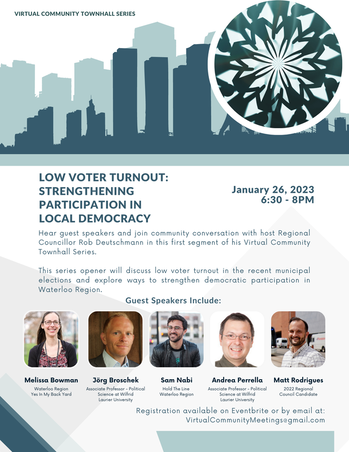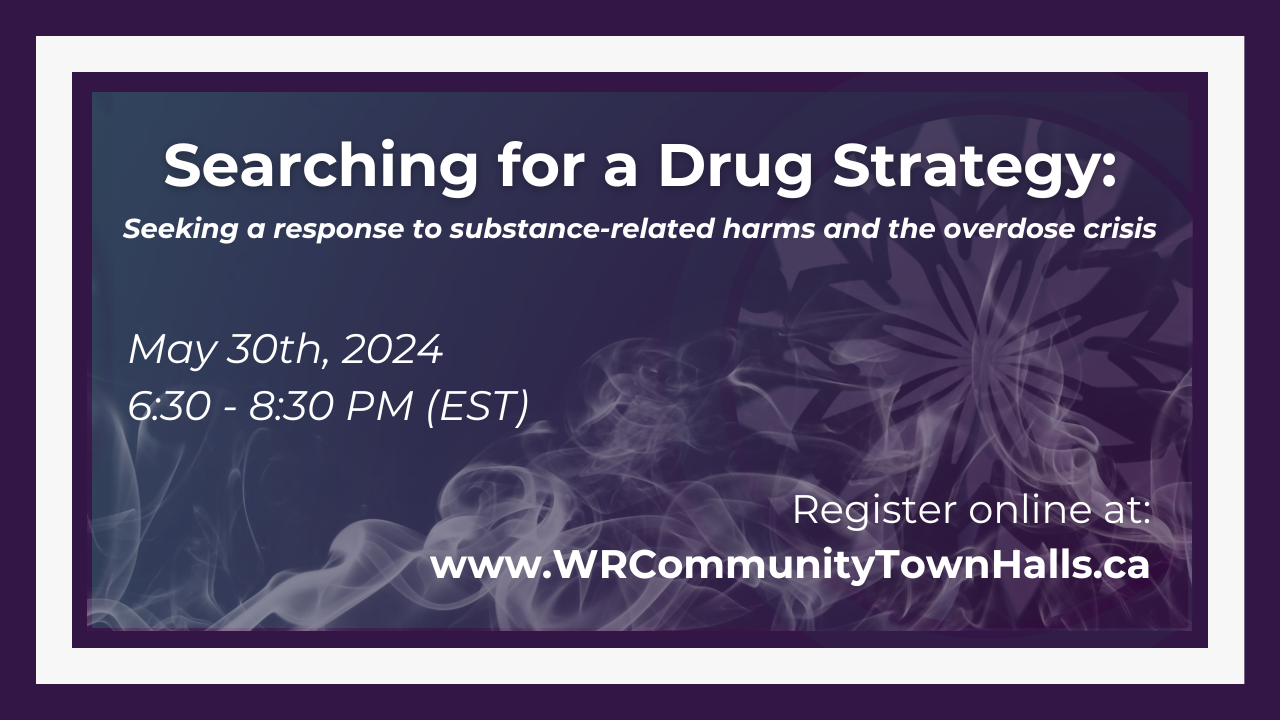Share
Event Summary:
|
The invited panellists were:
The virtual panel, held using the Zoom platform, was moderated by Councillor Rob Deutschmann who began with the powerful statement that
“...democracy has been dying for decades, and we have 90 minutes to fix it”.
Andrea Perella kicked off the town hall with a short history of declining voter turnout, considering elections and referenda. Prof Perella discussed some factors that appear to correlate with turnout including demographic age, workforce participation, unemployment rates, and ruralness. Concluding his comments, he described an erosion of our mid-twentieth-century social contract that has led voters to disconnect from the election process.
Matt Rodrigues took us through the 2022 municipal election from his perspective as a candidate for Waterloo Regional Council (Kitchener). He highlighted his experience connecting with residents, the effects of incumbency, and sign bylaw changes. Lack of awareness among voters, the convenience of voting stations, and long ballots stood out as factors that contribute to a lowering of turnout.
Melissa Bowman reflected on the impact of low turnout on the legitimacy of government. Bowman introduced some efforts to reduce barriers to candidacy and turnout from the Grey Highlands municipality. She discussed where the responsibility to promote elections rests, while
considering municipal efforts to engage residents, sign bylaws, and grassroots efforts. Melissa considered the establishment of political parties and ballot reform as ideas that deserve scrutiny.
Jörg Broschek presented four types of non-voter and the prospects for engaging each of them in the voting process. Prof Broschek identified 3 areas of reform - Education, Addressing social inequalities and inequities, and communication strategies. He was particularly critical of the lack of Indigenous participation in discussions of participation and reflected on the need to see voters and residents as not “just” taxpayers. The opportunity to re-engage voters through Citizens Assemblies is especially exciting.
Sam Nabi introduced the audience to some examples of community-building work in parallel to voting and election. His first example was Hold the Line Waterloo Region, including participatory events and advocacy on issues of urban sprawl in Waterloo. Following this, he related efforts to convert Gaukel St in Kitchener to a pedestrian-focused space. The lessons from these grassroots efforts give inspiration for how to build a coalition of engaged and active residents.
Following the panellist presentations, we were fortunate to have many voices in the audience that shared their experiences of the political process in Waterloo Region, of Citizens Assemblies, and the need to expand inclusion to younger voters. Contributing to this discussion were Jennifer Ross, Kari Williams, Brooklin Wallis, Ayo Owodunni, and Joshua Olivieri. Councillor Deutschmann captured the spirit of many speakers by observing that “Democracy is a lot of work, and sometimes we don’t realize that we have to put in that time.”
The audience appreciated an eclectic and relevant discussion of voter turnout - the causes, impacts, and some alternatives.
- Andrea Perella, Professor of Political Science at Wilfrid Laurier University
- Matt Rodrigues, Community Builder & Urban Planner
- Melissa Bowman, Housing Advocate, Writer & Publisher of the Citified Blog
- Jörg Broschek, Professor of Political Science at Wilfrid Laurier University
- Sam Nabi, Business owner and grassroots organiser in Waterloo Region
The virtual panel, held using the Zoom platform, was moderated by Councillor Rob Deutschmann who began with the powerful statement that
“...democracy has been dying for decades, and we have 90 minutes to fix it”.
Andrea Perella kicked off the town hall with a short history of declining voter turnout, considering elections and referenda. Prof Perella discussed some factors that appear to correlate with turnout including demographic age, workforce participation, unemployment rates, and ruralness. Concluding his comments, he described an erosion of our mid-twentieth-century social contract that has led voters to disconnect from the election process.
Matt Rodrigues took us through the 2022 municipal election from his perspective as a candidate for Waterloo Regional Council (Kitchener). He highlighted his experience connecting with residents, the effects of incumbency, and sign bylaw changes. Lack of awareness among voters, the convenience of voting stations, and long ballots stood out as factors that contribute to a lowering of turnout.
Melissa Bowman reflected on the impact of low turnout on the legitimacy of government. Bowman introduced some efforts to reduce barriers to candidacy and turnout from the Grey Highlands municipality. She discussed where the responsibility to promote elections rests, while
considering municipal efforts to engage residents, sign bylaws, and grassroots efforts. Melissa considered the establishment of political parties and ballot reform as ideas that deserve scrutiny.
Jörg Broschek presented four types of non-voter and the prospects for engaging each of them in the voting process. Prof Broschek identified 3 areas of reform - Education, Addressing social inequalities and inequities, and communication strategies. He was particularly critical of the lack of Indigenous participation in discussions of participation and reflected on the need to see voters and residents as not “just” taxpayers. The opportunity to re-engage voters through Citizens Assemblies is especially exciting.
Sam Nabi introduced the audience to some examples of community-building work in parallel to voting and election. His first example was Hold the Line Waterloo Region, including participatory events and advocacy on issues of urban sprawl in Waterloo. Following this, he related efforts to convert Gaukel St in Kitchener to a pedestrian-focused space. The lessons from these grassroots efforts give inspiration for how to build a coalition of engaged and active residents.
Following the panellist presentations, we were fortunate to have many voices in the audience that shared their experiences of the political process in Waterloo Region, of Citizens Assemblies, and the need to expand inclusion to younger voters. Contributing to this discussion were Jennifer Ross, Kari Williams, Brooklin Wallis, Ayo Owodunni, and Joshua Olivieri. Councillor Deutschmann captured the spirit of many speakers by observing that “Democracy is a lot of work, and sometimes we don’t realize that we have to put in that time.”
The audience appreciated an eclectic and relevant discussion of voter turnout - the causes, impacts, and some alternatives.



